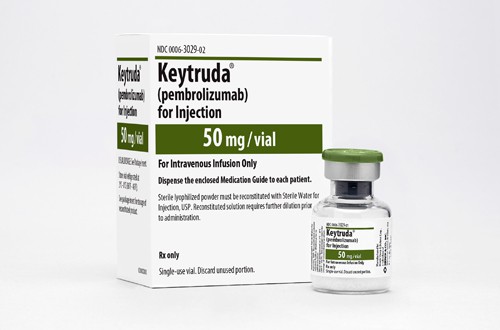
Merck & Co rounded off a busy ASCO conference with the news that its checkpoint inhibitor Keytruda has been granted a priority review by the FDA as a treatment for non-small cell lung cancer (NSCLC).
The FDA will now deliver a verdict on PD1 inhibitor Keytruda (pembrolizumab) by October 2, and looks likely to add lung cancer to the drug’s already-approved use in melanoma. That will also put it on level terms with rival Bristol-Myers Squibb (BMS), whose Opdivo (nivolumab) was approved for NSCLC in March.
The application is for the use of Keytruda in NSCLC patients whose disease has progressed on or after platinum-containing chemotherapy and an FDA-approved therapy for EGFR or ALK mutations, if present.
Merck presented data from several studies of Keytruda at ASCO, showcasing its activity in multiple cancers including advanced NSCLC as well as small cell lung cancer (SCLC) oesophageal, ovarian and head and neck cancer, amongst others.
On Monday, Merck reported data from a phase Ib trial involving heavily-pre-treated patients with SCLC, oesophageal and ovarian cancer looked at the efficacy of Keytruda in people whose tumours tested positive for the biomarker PD-L1.
Despite being very sick with advanced disease, Merck’s drug achieved response rates upwards of 30% with a number of patients seeing their tumours shrink.
In addition to the new clinical results, Merck has also continued to partner with other companies on the development of cancer regimens combining Keytruda with other drugs, recognising the benefits of targeting tumours with multiple treatment strategies.
A just-signed agreement with Dynavax will see Keytruda and another Merck compound – anti-interleukin-10 drug MK-1966 – tested alongside Dynavax’ SD-101, a toll-like receptor 9 (TLR9) agonist which is thought to stimulate multiple immune responses against tumour cells. Initial targets will be melanoma and haematological malignancies, said the two companies.
Meanwhile, Merck has also reached a deal with Tesaro to test Keytruda and the latter’s PARP inhibitor niraparib – a drug in the same class as AstraZeneca’s recently-approved Lynparza (olaparib) – in a phase I/II trial involving patients with triple negative breast or ovarian cancer.
Earlier, the company also signed an expanded deal to test Amgen’s oncolytic virus therapy talimogene laherparepvec with Keytruda in head and neck cancer.




